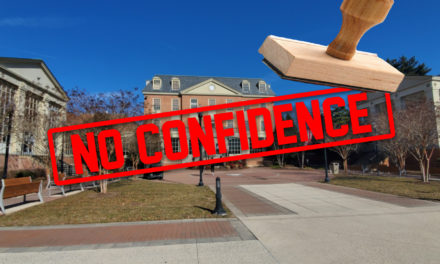By Kim Manahan (Whetstone staff writer)
Wesley College made a list it never wanted to be on.
With 149 other non-profit colleges, Wesley failed the Department of Education’s financial responsibility test.
For the first time in nine years, Wesley’s budget recorded a deficit. In 2008-2009, it was more than $1.8 million.
Eric Nelson, vice president of finance, blames the economy.
“[It’s because of the] drop in value of the investments of the college,†Nelson said.
It is the same reason for the last deficit the college had in 2001, he said.
After the Sept. 11 attacks, the stock market took a hit, Nelson said.
“The value of our stocks and our endowments went down like a lot of others,†said Dr. William Johnston, president of the college.
Johnston compares the government’s ratio to a student’s grade point average.
“If you have all B’s and an A in your GPA, and suddenly you get a D, that pulls the GPA down,†he said. “That pulled our score down.â€
Wesley plans to get back on top this year, he said.
Currently the stock market is hovering around 10,000, Nelson said. A few years ago it was nearly at 15,000.
“The stock market dropped in June 2009,†Nelson said. “[It was] almost at rock bottom. It lost a third of its value.â€
Wesley anticipates the failing score to be a one-year dip.
In contrast to the investments of the college, its operational expenses are fine.
One year ago, the college met all of its operational expenses and had more revenue than expenditures, Nelson said.
Investments are used to fund scholarships, so the school used its operating funds to make up for it.
“The college didn’t want to penalize students,†Nelson said.
According to the college’s 2008-09 IRS 990, the school took in nearly $40 million. The previous year, the revenue was about $39 million.
That same year, salaries increased.
Last year, salaries totaled almost $14 million. The previous year, it was a little more than $12 million.
“There was a larger class in 2009 than in 2008,†Nelson said. “We hired additional faculty and some new staff.â€
Another additional cost was the New Castle campus.
Ties with the Institute for Professional Development in Phoenix, Ariz., have been severed, Nelson said.
The college paid this contractor more than $1 million last year to run the marketing program for the New Castle campus.
“Wesley decided to operate on its own,†Johnston said.
Nelson said the college will save money by canceling the contract.
The expected revenue and expenditures for the current year is about $40 million, Nelson said.
“We are a not-for-profit, so we try to keep it as close as possible,†he said.




